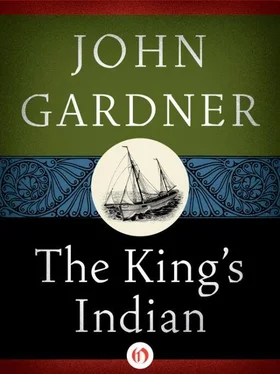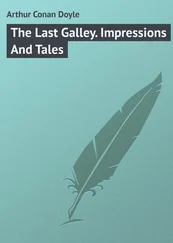“Whoa, boy,” I said, and stroked his nose. He stood swaybacked and suffering, remorseful. “No harm,” I said, still stroking his nose. “You’ve found us a fine, safe place to wait it out.” He turned his head toward me and I moved it with my hand. I could hardly stand his sorrow. No doubt that will seem a mite strange to some. (Human arrogance is never spent.) Nevertheless, the horse was profoundly ashamed and grieved at the way he’d stolen the authority.
In the end he was comforted and accepted my decision. I then made another, which was not altogether defensible, but I had no reasonable alternative. It was a simple fact that I had seen those twisters, and even a fatalist must cling to common sense. High wind is one thing; a twister is another. The wind that tore through the trees around us was dangerous enough — it snapped huge branches, smashed lilac bushes, even tore out boulders and rolled them as much as ten feet from their places. We were safe in our shelter if no cyclone struck. But cyclones are fanatic. No shelter can save you but the shelter designed by human ingenuity— deep in the earth, Time’s womb, as the evolutionists say. I’ve read about twisters that have raised whole houses up and sprayed human beings through four, five states. Whatever strange beings might live in that old towered house beyond the graveyard, if they were southern Illinoisans, they had a storm cellar. I couldn’t save my horse if a twister came wrecking all life where we stood, but I could crawl to that house in the hope of encountering friendly spirits and perhaps be saved.
“Stay here, boy,” I said, and I gave his wet, black neck a pat. “Do as I say. I’ll be back for you.”
No point recounting what terror I felt, crawling, clinging with both hands to the earth, fighting through the open space of unmowed lawn and tearing wind, toward the house that stood, stupidly defiant, on the treeless crest. Uprooted trees came lumbering toward me, slow and unnatural, like underwater creatures, snatching at me, and with them came smaller, swifter objects I couldn’t identify. Something living struck me on its way to its doom — a woodchuck, a rabbit, I have no idea — and clung with all its power till I beat it away. The roar of the world was deafening, the dust and small stones blown like needles against my face made me cough and clamp my eyes shut. But, at last, by some miracle, I reached the porch, slippery as flesh with ancient paint, and, still lying on my stomach, I pounded at the door. I couldn’t hear myself what sound I made. Bucking the wind, I reached for the huge brass doorknob — it was shaped like a gryphon’s head — and turned it. The door shot open. I tumbled in, driven by a gust that caught me like the kick of a mule, and lay on the carpet gasping for breath. Then the room quieted. Someone or something had closed the door.
I lay there groaning, no wiser than a horse. Then I fainted.
5
I came back to consciousness on an old, damp horsehair couch. I was aware, at first, only of the couch and the wallpaper, both of them thickly patterned with flowers, dark as cave walls, and scented with cat or baby urine. Little by little, I remembered what had happened, and I heard, as if in dim memory, the howl of the wind — clattering shutters against old brick walls, whistling past cornices, cracking the limbs of nearby trees. As consciousness brightened, I came to understand that the wind, the couch, the dark, flocked wallpaper, rotted by years in this thick, swampy climate, were real. There was a voice, a woman’s. It had been going, like a voice in a dream, for some time. It sharpened now. What it said, I couldn’t tell. I was dressed in warm, fresh-smelling clothes and had my spectacles on. Someone had cleaned them.
Then there seemed to be another voice, a man’s. I opened my eyes (I had slept again), and a blurry face was craning forward, looking down at me. I was aware, at first, only of red, red hair sweeping out like some ludicrous halo on a sunday-school painting, henna-red hair as ferocious and unnatural as the hair on an antique ventriloquist’s dummy. A sharp pain went up through my sinus passages and in a moment I recognized it: smelling salts. The voice said clearly, “He’s reviving now.” And then, without transition (as it seemed to me), I was sitting up, holding a glass of hot wine, and the redheaded man sat across from me, speaking, the wind still howling. On a low walnut table beside him an oil lamp flickered in the drafts that moved, indecisive and troubled, through the room. A figure all in white withdrew from us.
“A physician,” he said. “Interesting.”
I’d apparently been holding conversation with him, but I had, now, no memory of it.
He was silent for a time. Gradually his features came into focus. He had, I saw, no ordinary face. Enormous gazelle eyes as pale as glass, an uptilted nose above protruding, crooked teeth, and skin very nearly as ashen as dried-out clay. It was not necessarily an alarming face, though my first reaction was definitely alarm; but it was, emphatically, a kind of face you’d not expect to see twice on one planet. A vague uneasiness crept over me, or perhaps creeps over me now, the alarm of hindsight.
“I’m a physician myself,” he said, “—or used to be.” His smile was as quick and unsettling as lightning. “I gave up all caring for the sick long ago — stabbing deeper, so to speak. Driving my scalpel to the heart of things. If I could make sense of my terrible discoveries—”
Sudden as a genie, the woman dressed in white was there. I gave a little jump, in fact, she materialized so quickly. Yet her stance was casual, her pale, almost transparent hand seemed gentle and loving on his shoulder, drawing him back from me, calming him. “Surely our guest is not interested in that!” Her smile, false or not, was magnificent, transforming a plain, almost ghostly face into something radiant. Her hair was black, perhaps Italian, possibly Semitic, but some sickness (I suspected a cancer of the blood) had robbed her of the bloom one expects in Mediterraneans and had left her face moonlike, lusterless. She was twenty or twenty-five, not older. Her eyes, limpid brown, were startling if you happened to compare them with her husband’s (if he was, as I assumed, her husband) — those large eyes as cold and intellectual as death. One did not need to be a medical man to see that my host was in an extremely unhealthy psychological state and that the woman meant, subtly, to protect him from himself and me from him.
I said quickly, in slight befuddlement, “Not at all, not at all! It’s always a pleasure to meet a fellow physician!” And, a second too late, I gave a hearty laugh. It rang out demonic in the huge, dim room. They exchanged looks swifter than lightning bolts, and the man’s lips parted and stretched back in a grin. His crooked, jammed teeth flashed. For no reason that I can explain even now, a shock of terror went through me, blasted like a deep-laid dynamite charge from my spine to my brain. And instantly, as if to confirm that warning from the pit, the ghastly little scientist hurled himself toward me and snatched my free hand — my wine went flying, and I gave, I fear, a ridiculous whoop— but then, through my terror, I heard him bleating: “God bless you, Doctor! You’ve no conception what this does for me!” Then, seeing the wine splashed all over my knees, he shrank back, eyes widened, like a terrified horse. “Forgive me!” he cried.
“No, no!” I said. “No trouble! Mere trifle!” The pounding of my heart was dangerous, and I gasped for air, but pretended, even so, to laugh it off.
“Mother,” he said, “a cloth, quickly!”
She fled from the room. I stared after her, still clutching my chest. “That’s your mother?” I said, and took my glasses off. The woman was unquestionably ten years his junior. Immediately I saw my mistake— or thought I did. A mode of expression, one parent to another. Nevertheless, the sudden light in the pale man’s eyes was disquieting.
Читать дальше











![John Bruce - The Lettsomian Lectures on Diseases and Disorders of the Heart and Arteries in Middle and Advanced Life [1900-1901]](/books/749387/john-bruce-the-lettsomian-lectures-on-diseases-and-disorders-of-the-heart-and-arteries-in-middle-and-advanced-life-1900-1901-thumb.webp)
